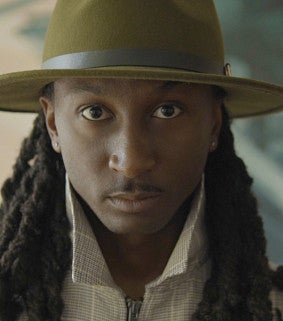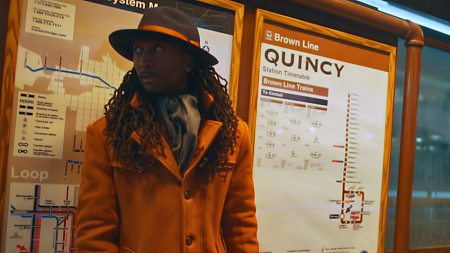Dr. Artel Great will teach a CHC winter term course to give students an understanding on the influences of Black films on society and American culture.
"When you’re a 17-year-old in the number one movie in America, it completely changes the trajectory of your life,” says Dr. Artel Great of his work on Save the Last Dance.

The movie’s success was instrumental to his career. The confidence he gained propelled him to continue acting, gaining more and more notoriety until scripts were being sent to him. But it was never fame or fortune that drew him to cinema. As a Black actor, he sought to make a greater impact on American culture.
Great’s renown only grew over the years, but the roles being offered didn’t fit the inherent sense of purpose he felt within himself. He turned down chances to play criminals and addicts time and time again.
“I had a vision for myself I wanted to be proud of, and I wanted the people back home to be proud of, too,” he says. There were unspoken limitations placed on Black creators in Hollywood, limitations Great could feel confining him.
It was the rejection of these limitations that led him to film school, even after having already broken into the industry. He hoped to learn the ins and outs of screenwriting and directing, but along the way he discovered a new goal: to “decolonize the canon” of cinema in America.
Now, as a professor of critical film studies at San Francisco State University, that means looking beyond the contributions of white men in American film. His research shows that Black creators have been at the heart of film since its inception, yet white Americans have ignored their work. Telling the part of the story they’ve erased is a mission he’s brought to both his work in the movie industry and academia.
In the wake of George Floyd’s murder at the hands of Minneapolis police, Great watched as corporations and writers put out think pieces, listing off films that would “help us not be racist.” Great found it to be an oversimplification of the situation at hand. In response, he wrote his signature essay, Black Cinema Matters, about the 125-year-old history of Black cinema, and how its erasure reflects on greater American society.
At the same time, the Clark Honors College was developing the Equity, Justice and Inclusion fellowship to foster conversation about race in the United States. Black scholars would come to the University of Oregon remotely to teach courses about their research. When Great saw his own goals to promote an anti-racist curriculum in academia in the fellowship’s mission, he decided to apply.
During the winter 2022 term, Great will be teaching Black Cinema and Social Change at the CHC. In his course, he plans to expand on the contents of his essay in a classroom setting. He hopes to “empower students with critical knowledge” by exposing them to the true story of cinema, and the way it connects to the narrative of race in America.
The power of movies isn’t just something he’s seen on a societal scale, however. Movies were integral in shaping his world view as well.

“As a child, I saw cinema as a doorway into possibilities.”
The movies were an event, something special to go do while growing up. When Great was younger, he couldn't see the complexities of filmmaking, though.
Movies were “just this thing that happened to us that we consumed,” he says. It wasn’t until Great got older and got his foot in the door of film studios that he saw what went into the cinema he watched.
In the 1980s and 90s, Great saw the Civil Rights movement’s efforts coming to fruition. As a Black American, he intuitively felt the way society was changing. For the first time, he was seeing Black artists, writers and athletes being the best artists, writers and athletes in America. Black power and soul movements made this new era of Black expressive culture possible. His worldview formed while watching the possibilities for his future expand.
“We were seeing, for the first time, Black filmmakers who were young and vibrant,” Great says. “It was only going up from here, right?”
Great worked hard as a teenager to take advantage of these new opportunities. At 15, he graduated from high school and got involved in local theater. He excelled as a performer but, despite this, he didn’t even consider getting into the cinema. Growing up in Chicago, connections to the film industry were few and far between. Yet somehow, a casting director with 20th Century Fox found him and invited Great to an audition, anyways.
“You know I’m not gonna say no,” he says. He thought he blew it. The other actors were more polished than him; while they brought headshots, Great had a high school photo.
He didn’t blow it, though. The director loved his tape and, at 17 years old, Great landed his role in Save the Last Dance. After moving to LA, he scored roles in David Jacobson’s Dahmer and the film adaptation of Their Eyes Were Watching God. But his return to academia opened a whole new world of cinema to him.
“Just do your best, whatever you do, just do your best,” he told himself when he began at the University of California Los Angeles’s School of Theater, Film, and Televisionfilm. His goal was to learn how to make movies to start creating his own films. At school, Great realized he’d already been studying cinema since childhood.
“We watch movies. We break them down. We talk about them, you know?” he says now. “But I didn’t realize it was an entire field of study.” While taking courses, Great was still acting and working. Not only did he get a real look at what the film industry was like, he got to see his studies and career work hand in hand.
He didn’t just learn, though. He excelled. While applying to graduate, Great discovered that he was going to be valedictorian. Not only valedictorian, but the first Black valedictorian in the history of the film program. As Great’s graduation approached, UCLA began thinking of ways to keep Great and his exemplary work at the school. So, they allowed him to attend graduate school for free and travel the world.
He also began teaching as he pursued a master's degree. Although he wasn’t aware of it, Great had been inclined towards teaching for a long time, and his father and academic advisor were happy to see him take the opportunity. Much like in acting, he knew he could make a positive impact through teaching. He developed his teaching style based on his own experiences in academia and continues to hold true to that method to this day.
“My professors were largely dry, white and boring,” he says. “My pedagogical practice evolved as an antidote to that.”
Great capitalizes on students’ excitement for film in a way his professors hadn’t, letting his passion show in his work. He moves away from dull lectures and instead prioritizes a dynamic classroom. He also strives to bring empathy to his teaching. His adaptations during the pandemic reflect that commitment.
“I looked at it as an opportunity to deepen the relationship with these students,” he says. As classes moved remote, he dedicated himself to organizing user-friendly course websites. Current CHC students enrolled in his course are sure to see his innovative approach to online learning.
Great’s mission to decolonize the canon will continue both in his CHC course and in the upcoming book, Black Cinema and Visual Culture: Art and Politics in the Twenty-First Century. He and his co-editor, Dr. Ed Guerrero, have created a detailed account of Black film and the adversities its creators have faced in the last two decades. The collection will be released in spring 2023 and feature contributions from top Black media scholars.
Across his teaching, creating, and researching, Great still strives to fulfill the purpose that’s driven him since childhood. In a “post George Floyd America,” that purpose calls him to illuminate the intricacies and impacts of Black cinema.
“Black cinema serves not only as an avenue of social protest,” he says, “but also as a vision for the hopes and dreams that this nation will one day live up to the true meaning of its creed.”
—Story by Elizabeth Yost, Clark Honors College Communications
—Photos courtesy of Artel Great
